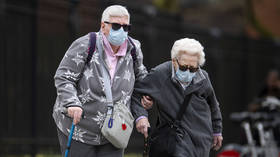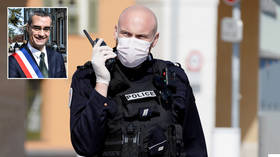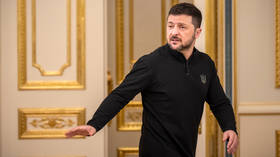We are all Robinson Crusoe now: How a 300-year-old book can help us survive the Covid-19 lockdown
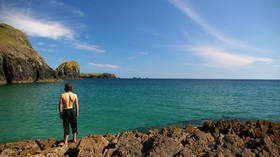
Around half of the world’s population are in some form of ‘lockdown’. It’s a tough time for many, but one classic novel, published over 300 years ago, offers hope, inspiration – and food for thought.
Daniel Defoe’s ‘The Life and Strange Surprizing Adventures of Robinson Crusoe, Of York. Mariner’, celebrated its tercentenary last year, but who could have predicted that the centuries-old book would become so relevant to our lives just one year later?
For in a sense, we’re all Robinson Crusoe now.
By and large we’re in the same boat as he was.
Just in case there’s anyone out there who doesn’t know the story: here are the basics. A shipwrecked sailor is washed up on a tropical island. He is alone and has to overcome solitude and the physical challenges of everyday life. But he survives. And we can survive lockdown too if we learn the same lessons Crusoe did.
Also on rt.com If new data suggesting Covid-19 no more lethal than FLU is correct, should the world REVERSE its lockdown strategy?First, we need to write down the comforts enjoyed against the miseries suffered as the world’s most famous shipwreck does. In the column entitled ‘Evil’, Crusoe puts down first “I am cast upon a desolate island, void of all hope of recovery.” Against that, in the ‘Good’ column, he writes: “But I am alive, and not drowned as my ship’s company was.” In 2020, in the Age of Corona we might begin our list with: “I am basically under house arrest, and can’t freely go out and mingle.” But against that, in the credit column, we can put “But I am alive, and not dead as sadly many people are from Covid-19.”
Crusoe also files under ‘Evil’: “I am divided from mankind, a solitaire, one banished from humane society.” We too are divided physically from mankind, and that is terrible, but unlike Crusoe we can still thankfully make telephone calls and keep in contact with each other via the postal service and social media.
His isolation also gives Crusoe plenty of opportunity to reflect on his life before his dramatic change of circumstances. Daniel Defoe was a religious man and frames Crusoe’s plight as a kind of punishment for his hero’s determination to defy his parents and go ‘wandering abroad’ in search of adventure and riches. The punishment is all the greater because Crusoe is by nature, sociable and gregarious. The violent storms which the boat he is sailing from twice encounter before he reaches London are ‘warnings’ from God, which Crusoe ignores.
Could what we’re going through at the moment be seen in similar terms? No-one here is saying that the spread of Covid-19 is ‘God’s punishment’, (God surely wouldn’t want so many to suffer in such a way), but hasn’t a certain arrogance, some would say hubris, got us to where we are today?
Most human beings, as Aldous Huxley once remarked, have an almost infinite capacity for taking things for granted. We took it for granted that pandemics, which would kill lots of people, were a thing of the past. The UK government for one seems to have taken a very blasé attitude. Writing in the Guardian on March 25, the environmentalist George Monbiot made a cogent case for arguing that Covid-19 was “nature’s wake up call for our complacent civilisation.”
“We have been living in a bubble”, Monbiot wrote. “A bubble of false comfort and denial. In the rich nations, we have begun to believe we have transcended the material world.”
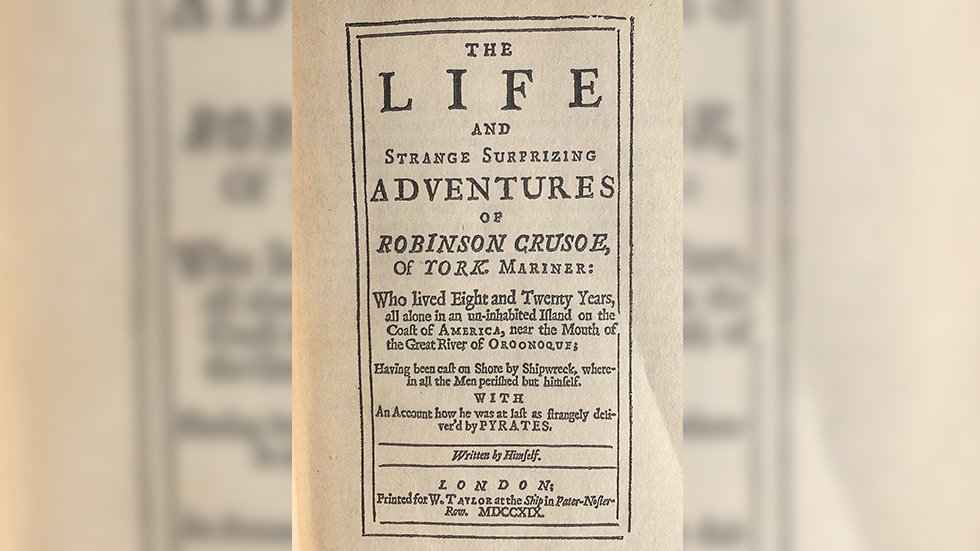
Crusoe uses his ‘lockdown’ to reflect on the things he did right and wrong in his life, and so should we, individually and collectively. Have we been too avaricious? In Angus Ross’s 1965 introduction to Defoe’s novel, he notes: “The religious overtones are seen in the immediate cause of Crusoe’s shipwreck, which was his greed, prompting him to ‘rise’ faster than ‘the nature of things admitted’ by going on a slaving expedition to Africa.”
Covid-19 has been called a disease of globalisation and the main driver of modern turbo-globalisation is greed. Declassified reported how the UK government saw China’s wet food markets (where Covid-19 is thought to have originated) and ‘food safety scandals’ as an ‘opportunity’ for UK exports.
Isn’t one of the main lessons of Covid-19 that we have to start to de-globalise a little?
"UK govt promoted exports of live animals/shellfish to China for years, knowing they would be sold at “wet markets”, amid repeated warnings from health authorities these markets posed influenza threat"Huge story from @pmillerinfo for @declassifiedukhttps://t.co/VrCy99Hyr8
— Matt Kennard (@DCKennard) April 4, 2020
In the last 20 years or so, everything has speeded up, arguably too much. Weren’t our lives before the ‘lockdown’ just a little bit too fast and furious in a 24-7 profit-maximising-obsessed world that never really gave us enough time to smell the roses?
Or time to grow as human beings.
Crusoe had never handled a tool before in his life, but by “labour, application and contrivance,” he manages to construct a table and chair. He learns new skills as he goes along. At first he describes himself as “poor miserable Robinson Crusoe,” but when he loses his self-pity, and comes to an acceptance of his situation, he actually starts to thrive. On the second anniversary of his arrival on the island he writes in his journal: “It was now that I began sensibly to feel how much more happy this life I now led was, with all its miserable circumstances, than this wicked, cursed, abominable life I led all the past part of my days; and now I changed both my sorrows and my joys… From this moment I began to conclude in my mind that it was possible for me to be more happy in this forsaken, solitary condition than it was probable I should ever have been in any other particular state in the world: and with this thought I was going to give thanks to God for bringing me to this place.”
It’s the kind of mindset we need to develop, not only to survive ‘lockdown’ but to actually turn it into a positive, life-changing experience.
Think your friends would be interested? Share this story!
The statements, views and opinions expressed in this column are solely those of the author and do not necessarily represent those of RT.

